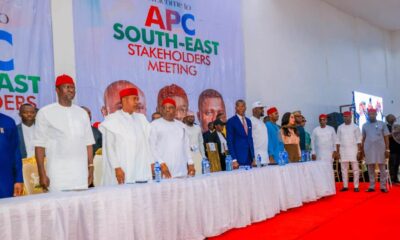News
CJN: Buhari yet to act on NJC’s recommendation


BY: Oliseama Okwuchukwu
Indicators emerged Friday on why President Muhammadu Buhari is yet to act on the recommendation of the National Judicial Council (NJC) that the suspended Chief Justice of Nigeria (CJN), Justice Walter Onnoghen, be retired.
The President, it was learnt, considered NJC’s letter ambiguous, as it did not clearly state why the suspended CJN should be retired.
The President was also said to have received some legal advice to ignore NJC’s recommendations on Onnoghen because the council’s letter did not follow constitutional process.
The ambiguity in NJC’s letter was said to have accounted for the current situation in which the nation is having a CJN and an Acting CJN.
Findings made by our correspondent revealed that NJC’s recommendation to the President only advised him to retire Onnoghen in the “interest of the nation and the Judiciary.”
The council was, however, silent on its findings on Onnoghen or whether or not he committed infractions based on the investigation of the Economic and Financial Crimes Commission (EFCC).
A top source said: “The recommendation of the NJC was a ‘legal soft landing for Onnoghen in order not to expose him to any further criminal trial based on EFCC’s investigation.
“The council advised the President to retire Onnoghen in the interest of the nation and the Judiciary. But Section 292 of the 1999 Constitution gave three conditions for the removal of a Judicial Officer, which include inability to discharge his duties, misconduct and contravention of the Code of Conduct.
“There is nowhere in the constitution where it is expressly stated that a CJN or a Judicial Officer can be retired in the interest of the nation and the Judiciary.
“If Onnoghen is removed or retired as contained in the NJC’s letter, the President’s action might be actionable. “You don’t build something on nothing.
“This is why the President is allowing the development in the Judiciary to follow a natural course.
“Onnoghen has offered to go on voluntary resignation or retirement and the Code of Conduct Tribunal has convicted him.
“There are three exit options for Onnoghen now as follows: retirement by NJC if put in a proper constitutional context; voluntary resignation or retirement if approved by NJC at its next meeting; and the CCT judgment if endorsed by the Court of Appeal and the Supreme Court.
“The President would have acted on any of these options but he has opted to follow due process to avoid being accused of hastiness in removing Onnoghen.
“The President is hamstrung by NJC’s recommendation, which was inexplicit. At a point, the NJC said Onnoghen should be compulsorily retired with full benefits.”
Responding to a question, the source added: “Actually, the President was advised to reject or ignore NJC’s recommendation on Onnoghen until the council is more forthcoming on why the suspended CJN should be retired.”
Section 292 says: “A Judicial Officer shall not be removed from his office or appointment before his age of retirement except in the following circumstances (a) in the case of —(i) Chief Justice of Nigeria, President of the Court of Appeal, Chief Judge of the Federal High Court, Chief Judge of the High Court of the Federal Capital Territory, Abuja, Grand Khadi of the Sharia Court of Appeal of the Federal Capital Territory, Abuja and President Customary Court of Appeal of the Federal Capital Territory, Abuja by the President acting on an address supported by two-thirds majority of the Senate
(ii) Chief Judge of a state, Grand Khadi of a Sharia Court of Appeal or President of a Customary Court of Appeal of a state by the Governor acting on an address supported by two-thirds majority of the House of Assembly of the state
“…praying that he be so removed for his inability to discharge the functions of his office or appointment (whether arising from infirmity of mind or of body) or for misconduct or contravention of the Code of Conduct. “(b) in any case, other than those to which paragraph (a) of this subsection applies by the President or as the case may be, the Governor acting on the recommendation of the NJC that the Judicial Officer be so removed for his inability to discharge the functions of his office or appointment (whether arising from infirmity of mind or of body) or for misconduct or contravention of the Code of Conduct.”
Another source added: “It is left to the NJC to be decisive in its recommendations and clean the Augean Stable in the nation’s Judiciary. It is really time to move forward. “It is of no use setting constitutional booby traps for the President. Let there be a clear direction to follow.” At press time, it was learnt that the NJC may meet next week to consider the observations of the President, the voluntary resignation/ retirement of Onnoghen and the extension of the tenure or appointment of the Acting CJN, Justice Ibrahim Tanko Muhammad as the substantive holder of the office. A source in NJC simply said: “The council may meet next week.”
-



 GROpinion7 hours ago
GROpinion7 hours agoThe Dark Side of Failing the Citizens and the Paradoxical Thriving of Undemocratic Politicians in Democracy
-





 News5 days ago
News5 days agoAbuja Programme of activities for late Barrister Princess Nwamaka Mediatrix Chigbo
-



 GRPolitics5 days ago
GRPolitics5 days agoS’East Governors, APC leaders, Stakeholders Endorse Tinubu for Second Term
-





 News5 days ago
News5 days agoGOCOP condoles with former president on Death of her sister






